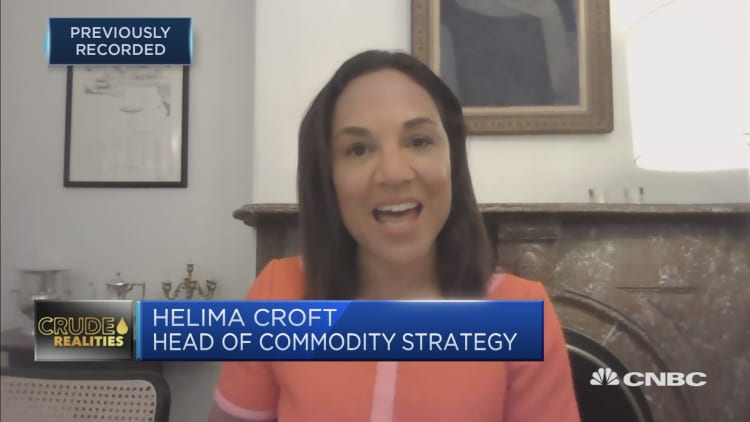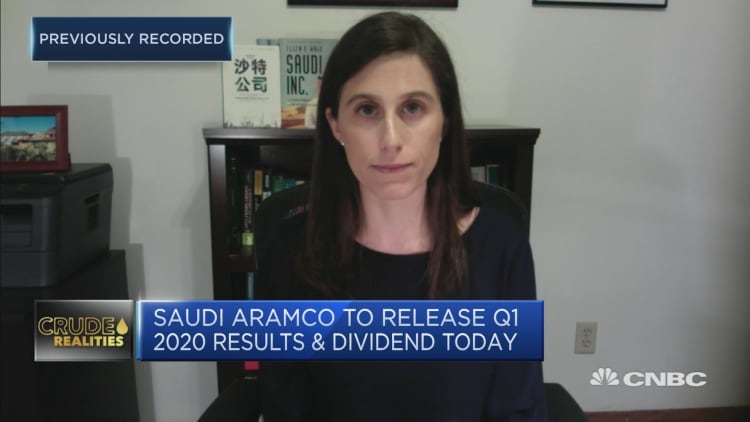
Voluntary production cuts by OPEC members show that oil producing countries are doing what they can to stabilize the market during the ongoing coronavirus outbreak, one strategist told CNBC this week.
Saudi Arabia on Monday said it will reduce output by an additional 1 million barrels per day from June 1, in a bid to support oil prices. Following the kingdom's announcement, the UAE and Kuwait also announced supply cuts. That's on top of an agreement between OPEC and non-OPEC allies, sometimes referred to as OPEC+, to lower production by 9.7 million bpd from May 1.
"The OPEC heavyweights are sort of lining up to try to do what they can to stabilize this market," said Helima Croft, global head of commodity strategy at RBC Capital Markets.
"We're already starting to see a pick up in demand as global lockdown conditions ease, people start driving again," she told CNBC's "Capital Connection" on Tuesday. "So, essentially what they're doing is acting as an accelerator in terms of getting the market rebalanced."
However, while there are "green shoots," the outlook is unclear as the pandemic continues.
"If we were to get a second wave in the crisis, if we were to get lockdown restrictions re-implemented, that could really change the trajectory of an oil price recovery," said Croft. "We really have to wait and see what is going to happen with this virus before we can basically say we're in the clear in terms of being on a sustainable path to recovery."
More than 4.18 million people have contracted Covid-19 worldwide, and at least 286,336 people have died from the virus, according to data compiled by Johns Hopkins University.
Oil futures have been under pressure for months as the coronavirus crisis has crushed demand, while supply spiked in April amid a price war. Both major benchmarks are down more than 50% since the beginning of the year.
It also remains to be seen whether the latest oil production cuts will "really shore up oil prices and help lift company revenues," said Ellen Wald, president of Transversal Consulting. She added that it will depend on whether Russia and Iraq follow through with their commitments.
"Those are really the two wildcards in this OPEC+ agreement," she told CNBC's "Street Signs Asia."
Saudi's supply reduction
Wald also said Riyadh's production cut is almost a response to the "knee-jerk" reaction it had when OPEC+ talks collapsed earlier this year.
"Saudi Arabia, in particular, is looking to regain a measure of leadership that I think it lost in March," she said.
The kingdom ramped up production to 12 million barrels a day after Moscow refused to agree to adjust oil supply. That policy "really backfired" because demand was extremely weak, she added.

RBC Capital Markets' Croft said Saudi Arabia is now back in "whatever it takes" mode. "The decision to cut 1 million barrels of production off the market, that was not expected."
"It looks like they're trying to give a shot of adrenaline to the oil market to get prices higher, and they really do need prices in a more constructive place," she said.
Besides the fact that Riyadh relies heavily on oil revenues to fund its government spending, a recovery in oil prices will also be "key" to changing public sentiment in the country, Croft said.
The kingdom this week announced an austerity drive that will see value-added taxes triple to 15%, cuts in government spending, and the suspension of allowances for public sector workers.
"That's why I think they're so focused on trying to basically do whatever it takes again, showing that Saudi Arabia will drive the oil market, that they are back in charge of OPEC."
— CNBC's Natasha Turak and Pippa Stevens contributed to this report.


